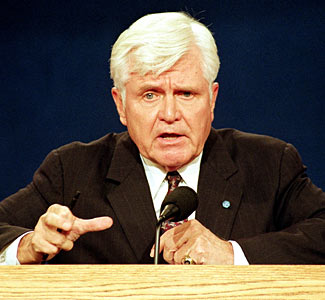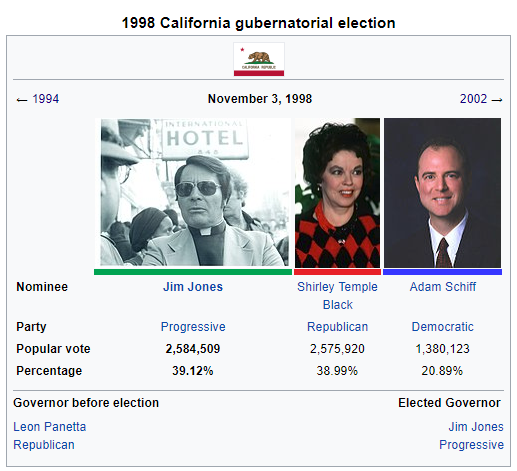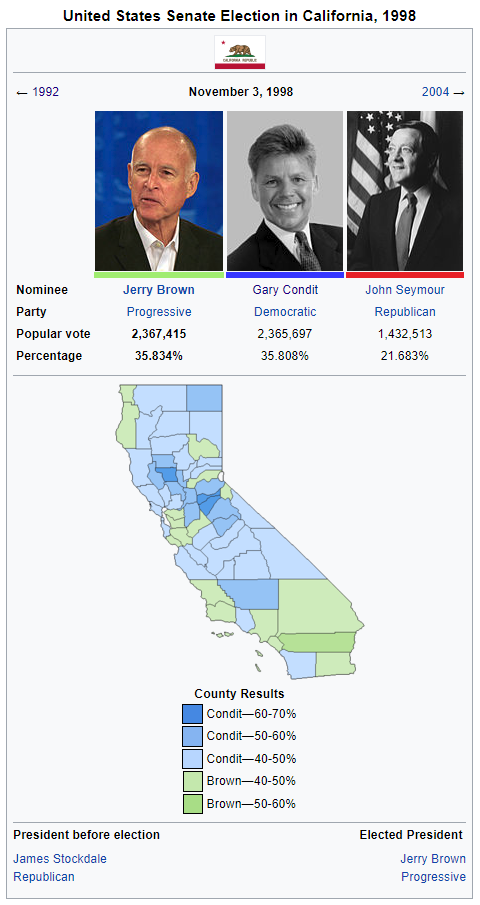1998 Midterms Part II
California had been the longtime stronghold of the Republican party. It had gone for the GOP in every presidential election since Ike except 1992, and was more often than not solidly Republican downballot. The advent of the Progressive party saw it become a three-party state, but the GOP continued to win into the mid-1990s.
Term limited, Governor Leon Panetta left a state both in prosperity and in turmoil. The economy was humming along well, taxes had been cut, and infrastructure development largely facilitated the massive population growth. However, the Drug War hit California hard. As a moderate, Panetta tried to balance things out, but intra-party pressure from President Bundy found him largely along for the ride. Such left him glad to be gone but a quite narrowly focused election to replace him developed. The frontrunner and anointed one on the GOP side was congresswoman and conservative stalwart Shirley Temple Black, while the Democrats nominated Los Angeles mayor Adam Schiff, a well known figure elected in a four way split that developed a soft-populist, Kennedy Democrat record. Energized on a “Stand up to Bundy” mood - like the one that got Bernie Sanders elected in NYC - the Progressives had a competitive primary that included such luminaries as Congressman James Hahn of LA, Hollywood actor and Mayor of Redondo Beach John Cusack, and State Senator Tom Hayden. But the race was shaken up by the entrance of a new figure… well, and old one.
Since the attempted assassination of Ronald Reagan was made by one of his supporters, former San Francisco Mayor Jim Jones had retired to a quiet life in the mid-1980s. Not seen for years, he came back into the public eye to lead People’s Temple efforts to help those hurt in the WWIII Soviet bombing of San Francisco. Such began a general rehabilitation of his image, and he desired to return to politics. Stockdale had bitterly attacked Jerry Jones for his affiliation to Jim Jones in the 1992 Senate race, but it had been a long 6 years. As the Progressive anger at Bundy morphed into electoral rage, Jones’ unquenchable ambition would turn towards statewide office. To great fanfare and derision, he announced he would run for the Progressive nomination.

Long secretive after his mayoralty was done, Jones burst back onto the scene with an energy and drive seen in men far younger.
Most didn’t take him seriously at first, as Reagan was a god to most Californians and a People’s Temple member had tried to kill him with a gun provided by one of Jones’ private security force. This did not deter Jones, who hired veteran political strategist Dick Morris to run his campaign. Morris was of the Roger Stone slash and burn political variety and that suited Jones well. Using the network of People’s Temple congregations as cash cows and free volunteers, Jones would travel the state and hold rallies filled with fiery red meat for the base. Morris bankrolled negative ads in TV and newspaper against all the primary candidates, while also employing private investigators to dig for dirt on everyone. Hayden was painted as a communist shill and quickly fell apart after past pro-Soviet rants were unearthed. Cusack was initially a threat, but Morris managed to cause his numbers to stagnate through painting him as an out of touch celebrity. The real threat was James Hahn, and he led Jones two weeks before the primary by 20 points. However, Morris’ goons found something damning and leaked it to the press - the LA Times ran with a story of intense police corruption in Los Angeles linked to the pro-Bundy police commissioner… who was a close friend of Congressman Hahn. To a base virulently hating Bundy, it was a blow that Hahn never recovered from. On primary day as Black and Schiff were nominated easily, Hayden received 3%, Hahn 21%, Cusack bounced back to 35%, while Jones shockingly topped all of them with 41% of the vote. Jim Jones was back.
An initial threat to Jones came in the frame of independent candidate Eric Boucher, a famous punk rock singer also known under the stage name Jello Biafra. Running on a firmly libertarian platform on social issues and the size of government, and quite anti-Bundy, many progressives felt he was a danger to their chances. A meeting alone with Jones and Morris neutralized that threat. Biafra in a press conference with Jones announced he was dropping out of the Governor’s race to run for Lt. Gov under the Progressive nomination (though he stayed registered as an independant). Jones endorsed him right then and there, while the little known Progressive Lt. Gov nominee dropped out so that Biafra could be their standard bearer against incumbent Republican Tom McClintock.
In the senate race, perennial candidate Jerry Brown, famous for rehabilitating his image of being “the cultists” according to Stockdale by teaching a course on “the Psychology of Cults at UC Riverside from 1994-1996, was back for another try, although him and the little known Democrat State Senator Gary Condit were considered afterthoughts against the popular Republican incumbent James Stockdale. Fate wound intervene however. On September 7, Stockdale announced to the world that he contracted alzheimer's disease. While it was the very early stages, he felt that it would be detrimental to his health and unfair to the citizens of California for him to continue in the senate, and announced his retirement. Stockdale would retire as “the most beloved 1-term senator” having been instrumental in many of the budget debates while also well-known for being extremely kind while helping Californians with citizenships, visas, etc.

Senator Stockdale announcing his retirement from politics.
After the earthquake finished shaking up the field, Ross Perot and the Progressive donor class began funnelling more and more money into Brown’s campaign. The man was a known commodity, with full name recognition from past runs for statewide and nationwide office. His small-p progressive views of social libertarianism and fiscal moderation fit the swing regions of the California electorate perfectly, especially with the backlash from the Bundy Drug War and Jim Jones’ gubernatorial run had in San Francisco. Brown immediately vaulted to frontrunner status - only exacerbated after a glum Republican convention nominated little-known Anaheim Mayor John Seymour, whose greatest accomplishment had been adding another lane ot the I-5. It seemed that Jerry Brown was on his way to a coronation.
This proved premature, and the cause was Gary Condit. The Democrats were initially bearish on the race, considering how weak the state party was. Condit was low on funds and had little organization, but threw himself into the race with the fury of a madman. Holding impromptu rallies and whistle-stop campaigning that made the local news, Condit’s charm and “Yorty Dem” appeal resonated with many that thought the Bundy GOP was too free-trade while the Progressives were too socially liberal. Brown, who was coasting, didn’t see the threat of Condit before a Pepperdine University poll in early October found the State Senator only four points behind. It was then that Brown’s campaign brought out the heavy hitting war chest as the race became a nail-biter.

In order to counter Brown's name recognition, Condit would make liberal use of local television appearances.
Condit’s rise in popularity was still yet overshadowed by the Governor’s race descending into what could only be described as a mud-wrestling match that even made Ted Bundy blink. The President would comment “Well of course I support Shirley, but Jones… he seems like the Prog version of me. And that’s only a half insult.” Jones and Morris saw the deciding votes of the election to be liberal Democrats that were voting for Jerry Brown, urban latinos, and black voters that could be persuaded to defect from the Lincoln/Nixon party. So the plan was decided: make Shirley Temple Black compete for her base and completely destroy Adam Schiff. As such, the ads and push polls flowed like an onrushing torrent upon the race. Former adorable child star Shirley Temple was accused of being a racist and a heartless slayer of innocent black men whose only crime was mouthing off to a drug cop, while benign Adam Schiff was a “crazy-eyed lunatic” that dabbled in conspiracy theories. When a private investigator found out that Schiff had held a closed to the public fundraiser with a known conspiracy theorist that had said things like “Corporate atheist propaganda needs to be wiped out so that we may journey to the glory of Christ upon the backs of the Sons of Ham,” Jones had a field day. He hammered home the message, ads flooding over the state calling Schiff a disgrace to the state, one that his campaign was too shellshocked into responding adequately. In addition, Schiff's party deep ties to labor unions were mocked in the song “California Uber Alles”, written by Eric Boucher himself, banking on his pre-political musical talents.
Attempts to smear Jones backfired, since everyone already knew his dirty laundry. His campaign projected an image of a deeply religious man, passionate and zealous for the cause of helping his fellow man - some People’s Temple affiliates portraying him as a saint-like figure who would minister to any flock since “no person is beyond saving.” Debates between him and Black were furious, focused on making her go negative and hurt one of her main strengths over Jones. The race was now between Black and Jones, down to the wire just as the Senate race was.

Results quickly showed it would be a long night. Schiff was getting clobbered everywhere and quickly became an afterthought, while the lead jumped back and forth between Black and Jones. SoCal and the East Bay suburbs were strong for Black, while the Bay Area cities and urban Los Angeles were equally strong for Jones. Rural Spanish-Americans, normally strong for Democrats, began to break 60% for Jones which netted him the central valley while blacks began to crack. His People’s Temple connections made him a non-Republican that had massive black appeal, earning him 30% of the vote. At midnight Pacific time, Jones jumped to a tiny lead and he never relinquished it. The unthinkable had happened. Jim Jones had risen like Lazarus and won the Governorship of California.

Compared to the governor’s race, the senate race was downright sleepy, but on election night it would be the one to watch. It was obvious that Stockdale’s exit had damaged the GOP campaign irreversibly, as Seymour wouldn’t win a single county. Apparently many Republicans had tactically voted - moderates and liberals for Brown or many conservative Bundy types for Condit. As such, the SoCal and Bay Area suburbs broke for Brown, while the rurals went hard for Condit. The result would be so narrow that a recount would be ordered, but over one month later it was finally called. Jerry Brown had finally won a major race. While Republicans carried three other statewide offices, a Democrat rode Condit (who many Democrats felt should challenge Ed Meese in 2000) to take Insurance Commissioner while Jello Biafra won the Lt. Governorship and the Progressives gained seven congressional seats for a plurality in the delegation. Jones, along with Brown, had turned all of California politics on its head.
California had been the longtime stronghold of the Republican party. It had gone for the GOP in every presidential election since Ike except 1992, and was more often than not solidly Republican downballot. The advent of the Progressive party saw it become a three-party state, but the GOP continued to win into the mid-1990s.
Term limited, Governor Leon Panetta left a state both in prosperity and in turmoil. The economy was humming along well, taxes had been cut, and infrastructure development largely facilitated the massive population growth. However, the Drug War hit California hard. As a moderate, Panetta tried to balance things out, but intra-party pressure from President Bundy found him largely along for the ride. Such left him glad to be gone but a quite narrowly focused election to replace him developed. The frontrunner and anointed one on the GOP side was congresswoman and conservative stalwart Shirley Temple Black, while the Democrats nominated Los Angeles mayor Adam Schiff, a well known figure elected in a four way split that developed a soft-populist, Kennedy Democrat record. Energized on a “Stand up to Bundy” mood - like the one that got Bernie Sanders elected in NYC - the Progressives had a competitive primary that included such luminaries as Congressman James Hahn of LA, Hollywood actor and Mayor of Redondo Beach John Cusack, and State Senator Tom Hayden. But the race was shaken up by the entrance of a new figure… well, and old one.
Since the attempted assassination of Ronald Reagan was made by one of his supporters, former San Francisco Mayor Jim Jones had retired to a quiet life in the mid-1980s. Not seen for years, he came back into the public eye to lead People’s Temple efforts to help those hurt in the WWIII Soviet bombing of San Francisco. Such began a general rehabilitation of his image, and he desired to return to politics. Stockdale had bitterly attacked Jerry Jones for his affiliation to Jim Jones in the 1992 Senate race, but it had been a long 6 years. As the Progressive anger at Bundy morphed into electoral rage, Jones’ unquenchable ambition would turn towards statewide office. To great fanfare and derision, he announced he would run for the Progressive nomination.

Long secretive after his mayoralty was done, Jones burst back onto the scene with an energy and drive seen in men far younger.
Most didn’t take him seriously at first, as Reagan was a god to most Californians and a People’s Temple member had tried to kill him with a gun provided by one of Jones’ private security force. This did not deter Jones, who hired veteran political strategist Dick Morris to run his campaign. Morris was of the Roger Stone slash and burn political variety and that suited Jones well. Using the network of People’s Temple congregations as cash cows and free volunteers, Jones would travel the state and hold rallies filled with fiery red meat for the base. Morris bankrolled negative ads in TV and newspaper against all the primary candidates, while also employing private investigators to dig for dirt on everyone. Hayden was painted as a communist shill and quickly fell apart after past pro-Soviet rants were unearthed. Cusack was initially a threat, but Morris managed to cause his numbers to stagnate through painting him as an out of touch celebrity. The real threat was James Hahn, and he led Jones two weeks before the primary by 20 points. However, Morris’ goons found something damning and leaked it to the press - the LA Times ran with a story of intense police corruption in Los Angeles linked to the pro-Bundy police commissioner… who was a close friend of Congressman Hahn. To a base virulently hating Bundy, it was a blow that Hahn never recovered from. On primary day as Black and Schiff were nominated easily, Hayden received 3%, Hahn 21%, Cusack bounced back to 35%, while Jones shockingly topped all of them with 41% of the vote. Jim Jones was back.
An initial threat to Jones came in the frame of independent candidate Eric Boucher, a famous punk rock singer also known under the stage name Jello Biafra. Running on a firmly libertarian platform on social issues and the size of government, and quite anti-Bundy, many progressives felt he was a danger to their chances. A meeting alone with Jones and Morris neutralized that threat. Biafra in a press conference with Jones announced he was dropping out of the Governor’s race to run for Lt. Gov under the Progressive nomination (though he stayed registered as an independant). Jones endorsed him right then and there, while the little known Progressive Lt. Gov nominee dropped out so that Biafra could be their standard bearer against incumbent Republican Tom McClintock.
In the senate race, perennial candidate Jerry Brown, famous for rehabilitating his image of being “the cultists” according to Stockdale by teaching a course on “the Psychology of Cults at UC Riverside from 1994-1996, was back for another try, although him and the little known Democrat State Senator Gary Condit were considered afterthoughts against the popular Republican incumbent James Stockdale. Fate wound intervene however. On September 7, Stockdale announced to the world that he contracted alzheimer's disease. While it was the very early stages, he felt that it would be detrimental to his health and unfair to the citizens of California for him to continue in the senate, and announced his retirement. Stockdale would retire as “the most beloved 1-term senator” having been instrumental in many of the budget debates while also well-known for being extremely kind while helping Californians with citizenships, visas, etc.

Senator Stockdale announcing his retirement from politics.
After the earthquake finished shaking up the field, Ross Perot and the Progressive donor class began funnelling more and more money into Brown’s campaign. The man was a known commodity, with full name recognition from past runs for statewide and nationwide office. His small-p progressive views of social libertarianism and fiscal moderation fit the swing regions of the California electorate perfectly, especially with the backlash from the Bundy Drug War and Jim Jones’ gubernatorial run had in San Francisco. Brown immediately vaulted to frontrunner status - only exacerbated after a glum Republican convention nominated little-known Anaheim Mayor John Seymour, whose greatest accomplishment had been adding another lane ot the I-5. It seemed that Jerry Brown was on his way to a coronation.
This proved premature, and the cause was Gary Condit. The Democrats were initially bearish on the race, considering how weak the state party was. Condit was low on funds and had little organization, but threw himself into the race with the fury of a madman. Holding impromptu rallies and whistle-stop campaigning that made the local news, Condit’s charm and “Yorty Dem” appeal resonated with many that thought the Bundy GOP was too free-trade while the Progressives were too socially liberal. Brown, who was coasting, didn’t see the threat of Condit before a Pepperdine University poll in early October found the State Senator only four points behind. It was then that Brown’s campaign brought out the heavy hitting war chest as the race became a nail-biter.

In order to counter Brown's name recognition, Condit would make liberal use of local television appearances.
Condit’s rise in popularity was still yet overshadowed by the Governor’s race descending into what could only be described as a mud-wrestling match that even made Ted Bundy blink. The President would comment “Well of course I support Shirley, but Jones… he seems like the Prog version of me. And that’s only a half insult.” Jones and Morris saw the deciding votes of the election to be liberal Democrats that were voting for Jerry Brown, urban latinos, and black voters that could be persuaded to defect from the Lincoln/Nixon party. So the plan was decided: make Shirley Temple Black compete for her base and completely destroy Adam Schiff. As such, the ads and push polls flowed like an onrushing torrent upon the race. Former adorable child star Shirley Temple was accused of being a racist and a heartless slayer of innocent black men whose only crime was mouthing off to a drug cop, while benign Adam Schiff was a “crazy-eyed lunatic” that dabbled in conspiracy theories. When a private investigator found out that Schiff had held a closed to the public fundraiser with a known conspiracy theorist that had said things like “Corporate atheist propaganda needs to be wiped out so that we may journey to the glory of Christ upon the backs of the Sons of Ham,” Jones had a field day. He hammered home the message, ads flooding over the state calling Schiff a disgrace to the state, one that his campaign was too shellshocked into responding adequately. In addition, Schiff's party deep ties to labor unions were mocked in the song “California Uber Alles”, written by Eric Boucher himself, banking on his pre-political musical talents.
I am Governor Daniel White
It’s the one race I care about
Soon I will be the president
Wallace’s power will go 'way
I will be Führer one day
I will command all of you
Your kids will unionize in school
Your kids will unionize in school
California Über Alles
California Über Alles
Über Alles California
Über Alles California
It’s the one race I care about
Soon I will be the president
Wallace’s power will go 'way
I will be Führer one day
I will command all of you
Your kids will unionize in school
Your kids will unionize in school
California Über Alles
California Über Alles
Über Alles California
Über Alles California
Attempts to smear Jones backfired, since everyone already knew his dirty laundry. His campaign projected an image of a deeply religious man, passionate and zealous for the cause of helping his fellow man - some People’s Temple affiliates portraying him as a saint-like figure who would minister to any flock since “no person is beyond saving.” Debates between him and Black were furious, focused on making her go negative and hurt one of her main strengths over Jones. The race was now between Black and Jones, down to the wire just as the Senate race was.
Results quickly showed it would be a long night. Schiff was getting clobbered everywhere and quickly became an afterthought, while the lead jumped back and forth between Black and Jones. SoCal and the East Bay suburbs were strong for Black, while the Bay Area cities and urban Los Angeles were equally strong for Jones. Rural Spanish-Americans, normally strong for Democrats, began to break 60% for Jones which netted him the central valley while blacks began to crack. His People’s Temple connections made him a non-Republican that had massive black appeal, earning him 30% of the vote. At midnight Pacific time, Jones jumped to a tiny lead and he never relinquished it. The unthinkable had happened. Jim Jones had risen like Lazarus and won the Governorship of California.
Compared to the governor’s race, the senate race was downright sleepy, but on election night it would be the one to watch. It was obvious that Stockdale’s exit had damaged the GOP campaign irreversibly, as Seymour wouldn’t win a single county. Apparently many Republicans had tactically voted - moderates and liberals for Brown or many conservative Bundy types for Condit. As such, the SoCal and Bay Area suburbs broke for Brown, while the rurals went hard for Condit. The result would be so narrow that a recount would be ordered, but over one month later it was finally called. Jerry Brown had finally won a major race. While Republicans carried three other statewide offices, a Democrat rode Condit (who many Democrats felt should challenge Ed Meese in 2000) to take Insurance Commissioner while Jello Biafra won the Lt. Governorship and the Progressives gained seven congressional seats for a plurality in the delegation. Jones, along with Brown, had turned all of California politics on its head.



